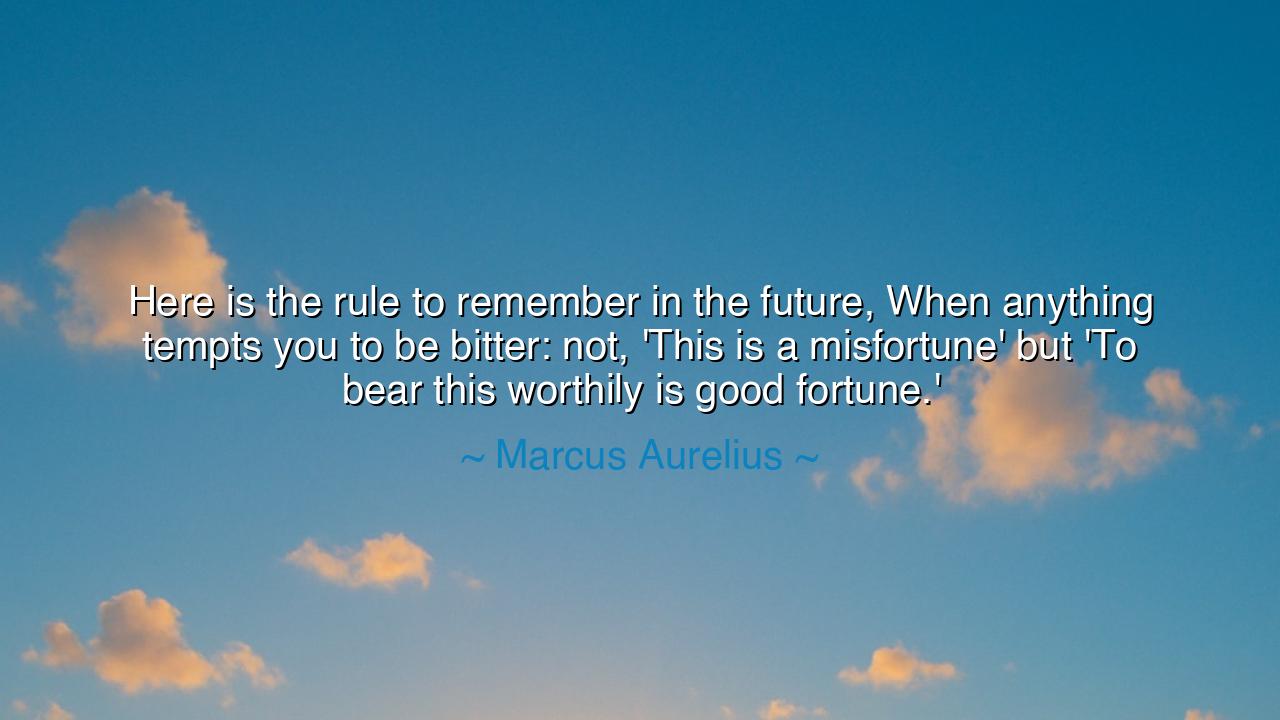
Here is the rule to remember in the future, When anything tempts
Here is the rule to remember in the future, When anything tempts you to be bitter: not, 'This is a misfortune' but 'To bear this worthily is good fortune.'






In the vast journey of life, there are moments when misfortune strikes, when hardship and sorrow seem to weigh heavily upon us. In those moments, it is easy to fall into the temptation of bitterness, to look upon our trials as obstacles too great to bear. But Marcus Aurelius, the wise Stoic emperor, offers a profound piece of wisdom: "Here is the rule to remember in the future, When anything tempts you to be bitter: not, 'This is a misfortune' but 'To bear this worthily is good fortune.'" These words are not simply a reflection on adversity, but a powerful invitation to reframe how we view the challenges of life, urging us to transform hardship into an opportunity for growth, courage, and virtue.
In the ancient traditions, the concept of misfortune was never seen as a force to be defeated or lamented. Rather, the philosophers of old, like Socrates and Epictetus, viewed adversity as a test, a crucible in which the character of a person could be forged. The ancient Greek notion of virtue was not about avoiding pain or difficulty, but about how one faced it. Socrates, when sentenced to death, did not weep or curse his fate but met it with grace and wisdom. In the same spirit, Marcus Aurelius teaches us that our response to adversity is the true measure of our character, not the misfortune itself. The real fortune lies in how we bear what life brings, and in that process, we become greater than we were before.
Consider the story of the great general Hannibal Barca, who famously crossed the Alps with his army in the Second Punic War, facing countless hardships and obstacles. While many would have seen this as a misfortune too great to overcome, Hannibal did not. He viewed these challenges as part of his destiny, something to be endured and mastered. His ability to face such immense challenges with steadfastness and resolve led to some of his greatest victories. The misfortune of the difficult journey became, in Hannibal's hands, a source of glory and strength. This story mirrors the wisdom that Marcus Aurelius imparts: it is not the obstacle itself, but our ability to face it with virtue, that defines the course of our life.
The essence of Stoicism, as taught by Marcus Aurelius, lies in the power of the mind to shape how we experience the world. A person who follows the Stoic path does not allow external events to dictate their emotional state, but instead looks inward, seeking to maintain equanimity, grace, and courage in the face of life's challenges. Aurelius, throughout his writings, often reflects on the impermanence of all things, understanding that life’s difficulties are but fleeting moments in the grand tapestry of existence. The Stoic does not dwell on the misfortune itself, but asks: "What can I learn from this? How can I grow from this?" To bear adversity with dignity is not a sign of weakness, but of strength and wisdom.
In our own lives, we are often tempted to view challenges as misfortunes—be it the loss of a job, a broken relationship, or personal failure. These are the moments when we are most vulnerable to bitterness, to seeing the world as unfair and ourselves as victims. Yet Marcus Aurelius, with his timeless wisdom, encourages us to shift our perspective. Rather than seeing hardship as a blow to our well-being, we should view it as an opportunity to grow, to strengthen our resolve, and to build a character that is unshaken by the shifting tides of fortune. This lesson is especially relevant in times of crisis, when it is easy to lose sight of the greater purpose behind our suffering. The ability to turn suffering into an opportunity for growth is the hallmark of a truly virtuous life.
The key lesson from Marcus Aurelius’ quote is one of personal responsibility and empowerment. Life will bring us challenges, but it is not these challenges that define us—it is how we respond to them. In every difficulty, there is the potential to discover strength, wisdom, and compassion. We are not helpless in the face of adversity; instead, we are called to rise to the occasion, to bear what comes our way with courage and grace. Every moment of suffering is an opportunity to cultivate virtue and resilience, to forge a character that is truly unshakeable.
As we navigate the twists and turns of our own lives, let us remember Marcus Aurelius’s wisdom: when we are tempted to feel bitter or overwhelmed by the weight of our struggles, we must instead say to ourselves, “To bear this worthily is good fortune.” By choosing to rise above hardship, to face adversity with a spirit of dignity and purpose, we not only overcome the obstacle at hand, but we also shape ourselves into individuals worthy of the challenges that life presents. Let us embrace the trials of life, not as burdens, but as stepping stones on the path to a noble, fulfilled, and virtuous existence.






AAdministratorAdministrator
Welcome, honored guests. Please leave a comment, we will respond soon